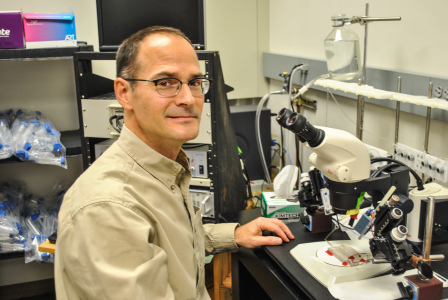Professor Mark Levandoski, Chemistry, recently received a $414,652 grant to research the role that central nervous system cells have in the development of nicotine addiction and neurological diseases such as Parkinson’s and Alzheimer’s.

Photo by Parker Van Nostrand.
The National Institutes of Health (NIH) awarded the grant, officially the Academic Research Enhancement Award. Within the NIH, it was the National Institute for Neurological Disorder and Stroke that awarded Levandoski the grant.
“The primary criterion for receiving the grant is that the institution [Grinnell] doesn’t exceed some threshold of NIH funding. It tends to be smaller schools [that] receive the funding,” Levandoski said.
He also mentioned that his project was selected from among a more competitive pool of applicants.
“There are a smaller percentage of proposals being funded compared to 10 or 15 years ago, but mine was funded,” he said.
Levandoski’s research primarily focuses on the central nervous system and the communication between that and other parts of the body.
“I study a group of proteins that are in your central nervous system, and they also are the most famous cousin, so to speak, as those in your muscles. [This system] is a way for cells to talk to each other in the grandest scale,” he explained.
Levandoski noted that his research is still in a relatively unclear field, and that there is a lot of progress to be made. Specifically, the protein groups he studies in the central nervous system bridge a gap into research on cognitive diseases that have confounded researchers for many years.
“We know comparatively little about the cells of the central nervous system … they are more diverse and we know less about them,” Levandoski said. “If we don’t know as much as we can know about these proteins then we can’t know how they may be malfunctioning in some sort of disease state.”
Levandoski will be working with professors and researchers from the University of Copenhagen on their studies of this protein group, supported by funding from the grant.
“[The professors] I will be working with [are] a medicinal chemistry group,” Levandoski said. He added that this partnered research could potentially lead to model drugs with the methods of the University of Copenhagen professors.
The communication between Levandoski and the professors is currently taking place online, but their collaboration involves their individual research as well.
“They build molecules, send them here and we test them,” he said.
Levandoski expressed the hope that students would have opportunities to get involved in the research as well. He anticipates that studying these receptors and protein groups will lead to possible clinical applications in the future. These would be used as a therapeutic in the case of nicotine addiction or cognitive diseases.
“There is the potential for the molecules that I have studied to lead to new molecules that could then be used as a therapeutic,” Levandoski said. “There’s a big question mark … that this particular protein system has a role in particular disease states … it could be that they are involved but are not the central cause [of disease]. They play a role because [these diseases] are a multifaceted problem.”




























































